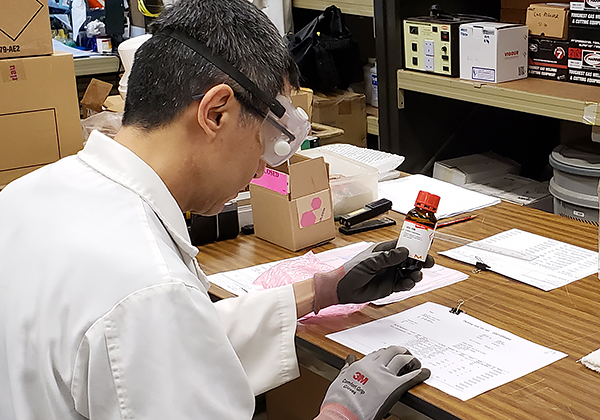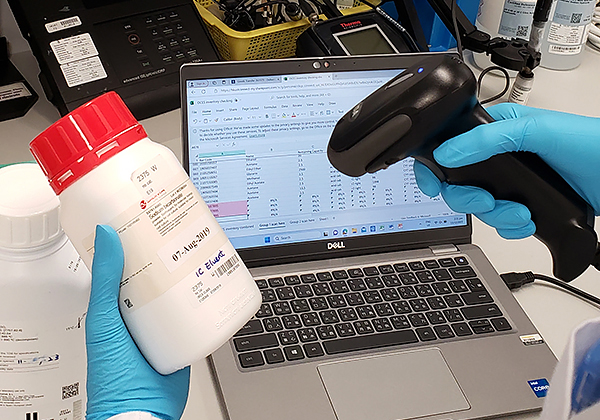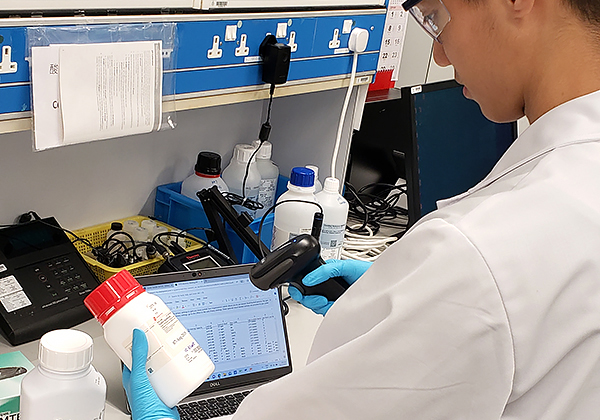Laboratory Safety
Chemical Safety Management in HKUST
Safety management of dangerous chemicals is of utmost importance in universities where research and educational activities involve the handling and usage of various hazardous substances.
This article explores key aspects of safety management in the HKUST, including purchase control, central receiving and delivery of chemicals to research laboratories, barcode systems for inventory stocktake, and centralized chemical waste collection services. By implementing robust safety protocols, the university can ensure the well-being of students, staff, and the surrounding environment while fostering a culture of responsible chemical handling.

Purchase Control
Effective purchase control plays a crucial role in safety management at HKUST. This entails implementing rigorous procedures for procuring hazardous chemicals, with a focus on authorizing only designated personnel to carry out purchases. Centralizing the purchasing process under the supervision of trained staff enables strict control over the types and quantities of chemicals acquired, ensuring compliance with government or university regulations, including the exempted amount specified by the Hong Kong Fire Services Department's Dangerous Goods Ordinance. By maintaining an approved supplier list and verifying vendor credentials, the university guarantees the procurement of high-quality chemicals that meet safety standards.
Central Receiving and Delivery of Chemicals to Research Laboratories
The central receiving and delivery system plays a critical role in the safe handling of dangerous chemicals within the university. Upon delivery, all chemicals should be inspected to confirm their integrity and compliance with safety standards, affixed with barcodes and updated in the chemical inventory system. CLS staff should handle the transfer of chemicals from the central storage area to the respective research laboratories, following established protocols to minimize potential risks.



Implementing a Barcode System for Inventory Stocktake
A barcode system for inventory stocktakes is an invaluable tool for managing dangerous chemicals in academic institutions. By affixing unique barcodes to each chemical container, the university can maintain an accurate and up-to-date inventory of the chemicals in their possession. This system enables efficient tracking of chemical usage, storage, and disposal. Regular stocktake exercises conducted by research staff help identify discrepancies, expired chemicals, or any missing containers. By promptly addressing such issues, the university can prevent accidents, minimize waste, and ensure compliance with regulatory requirements.
Centralized Chemical Waste Collection Services
Proper disposal of hazardous chemical waste is a crucial aspect of safety management in HKUST. Implementing a centralized chemical waste collection service ensures that hazardous waste is handled and disposed of appropriately, minimizing the risk of environmental contamination and harm to individuals. Trained personnel should collect chemical waste from research laboratories and store it safely until it can be disposed of through authorized channels. For details of disposal of hazardous waste, please refer to the Laboratory Safety Fact Sheet – Hazardous Waste Management for details. By adhering to local regulations regarding the disposal of hazardous waste, the university can mitigate potential risks and uphold its commitments to environmental stewardship.
Conclusion
Safety management of dangerous chemicals is of paramount importance in HKUST. By implementing effective strategies such as purchase control, central receiving and delivery systems, barcode systems for inventory stocktakes, and centralized chemical waste collection services, academic institutions can safeguard the well-being of their students, staff, and the environment. It is imperative for the university to prioritize safety by establishing comprehensive protocols, providing appropriate training to personnel, and regularly reviewing and updating their safety procedures. By fostering a culture of responsible chemical handling, HKUST can create an environment that supports research and education while ensuring the highest standards of safety.
